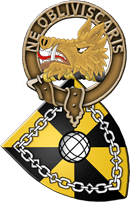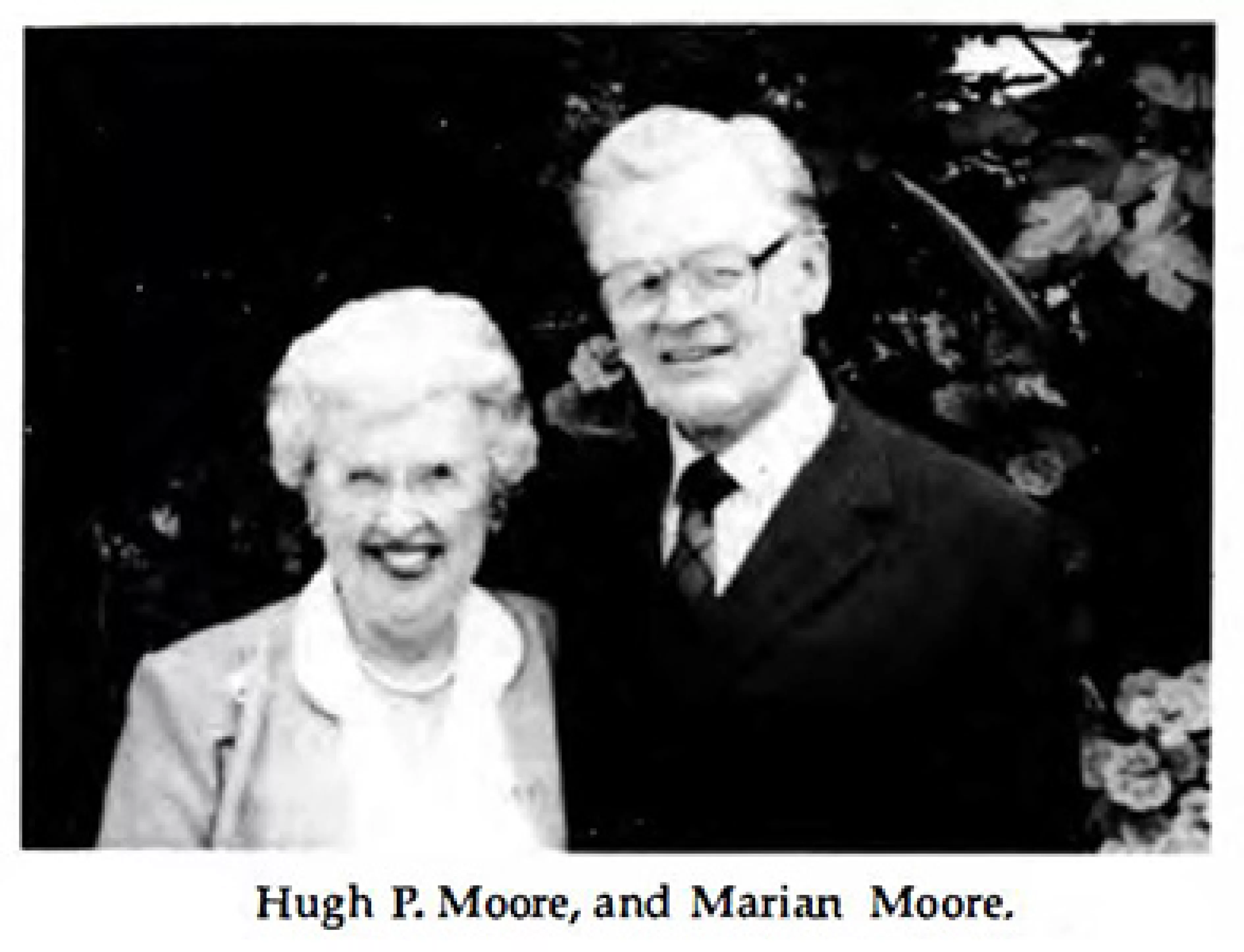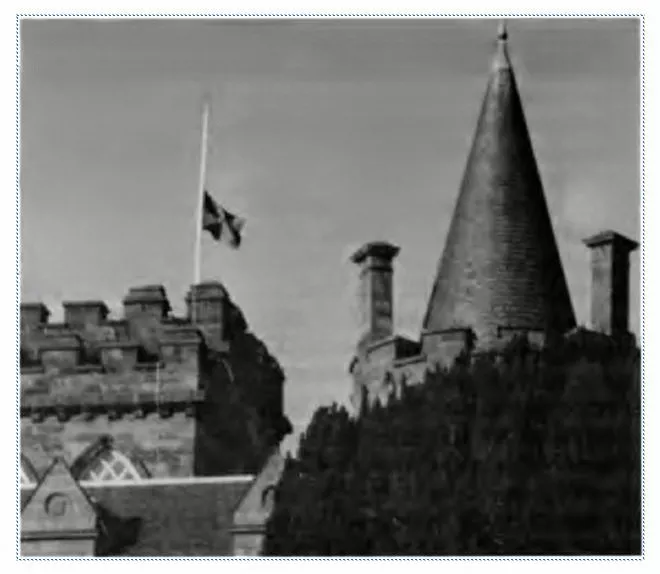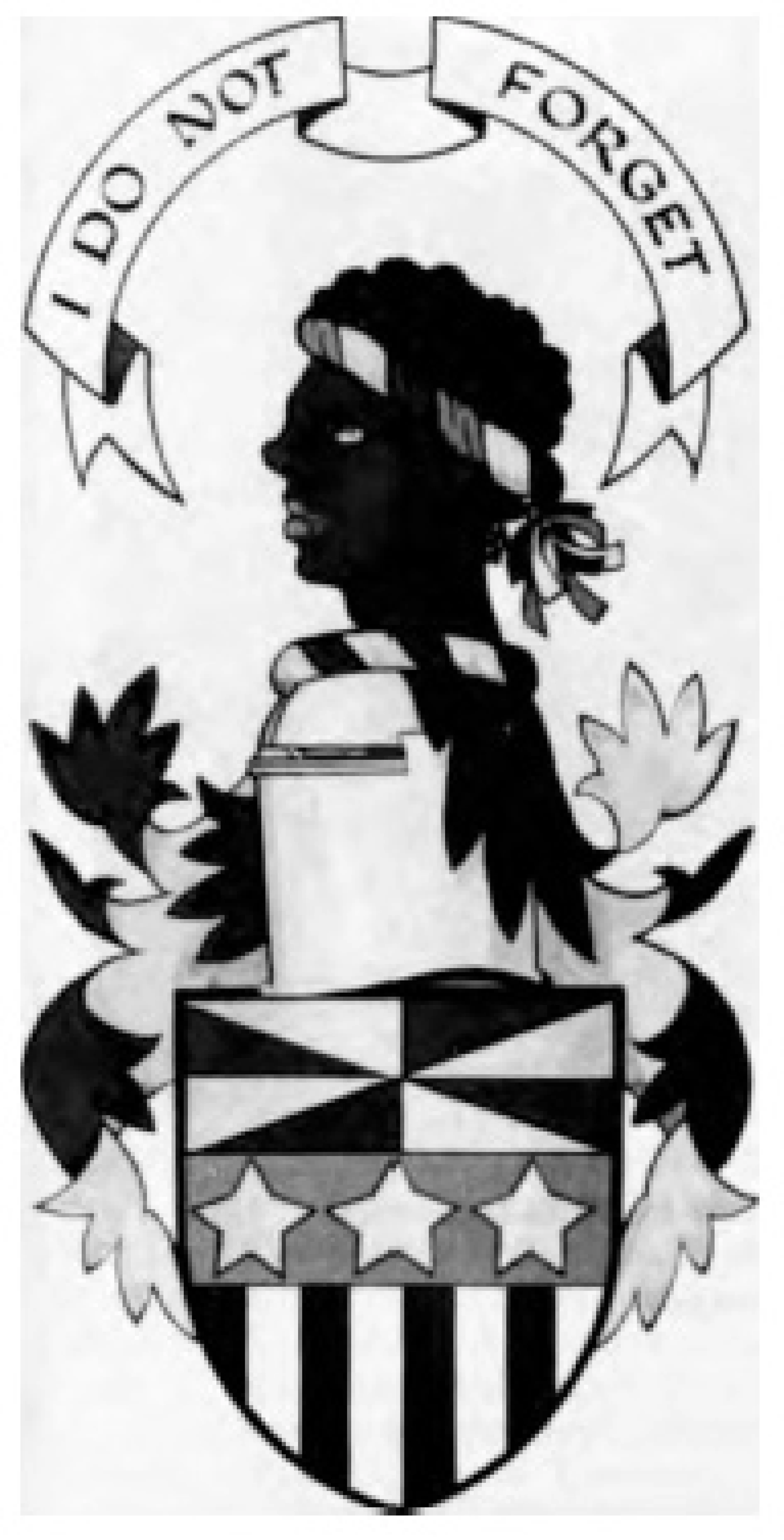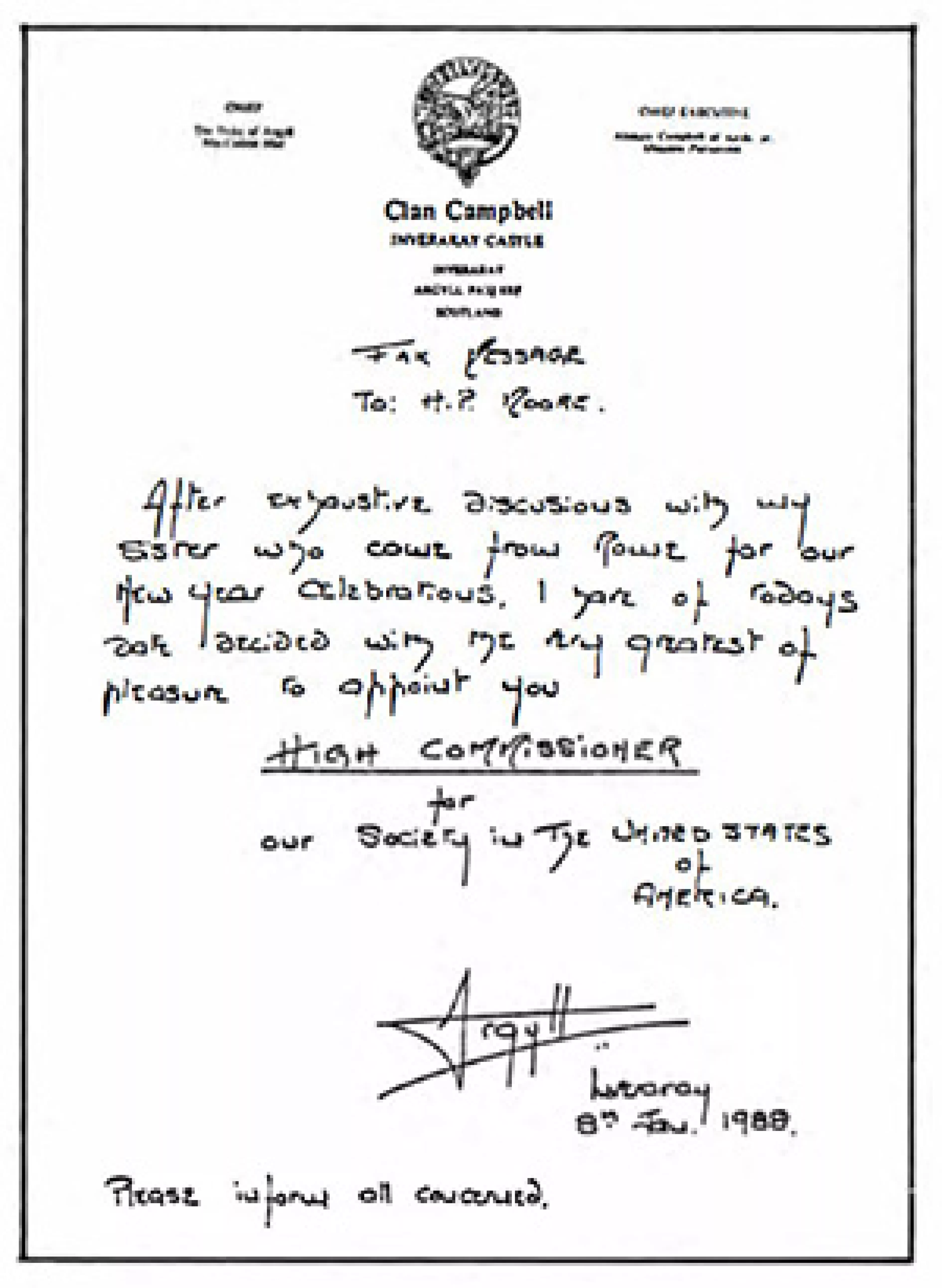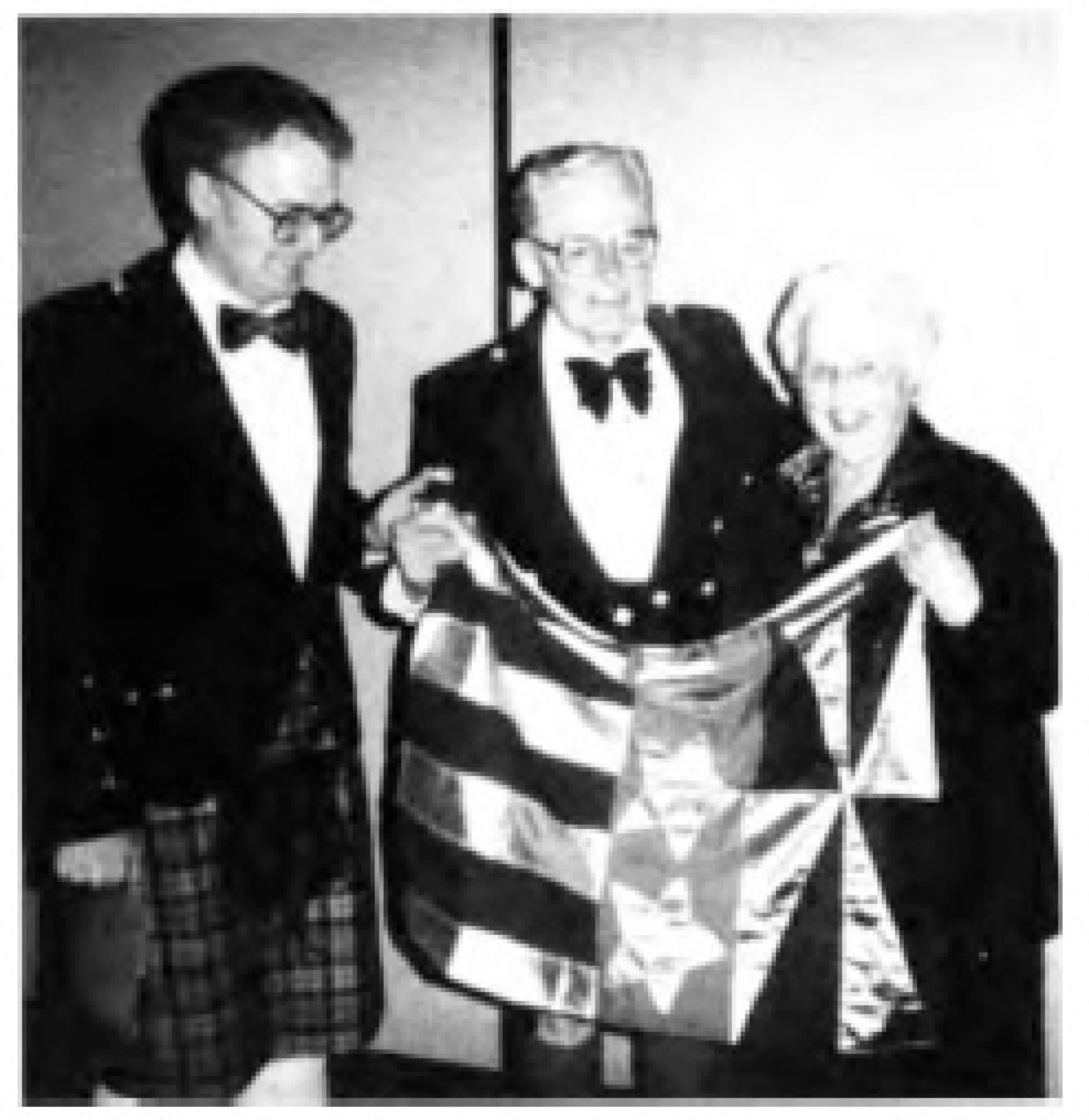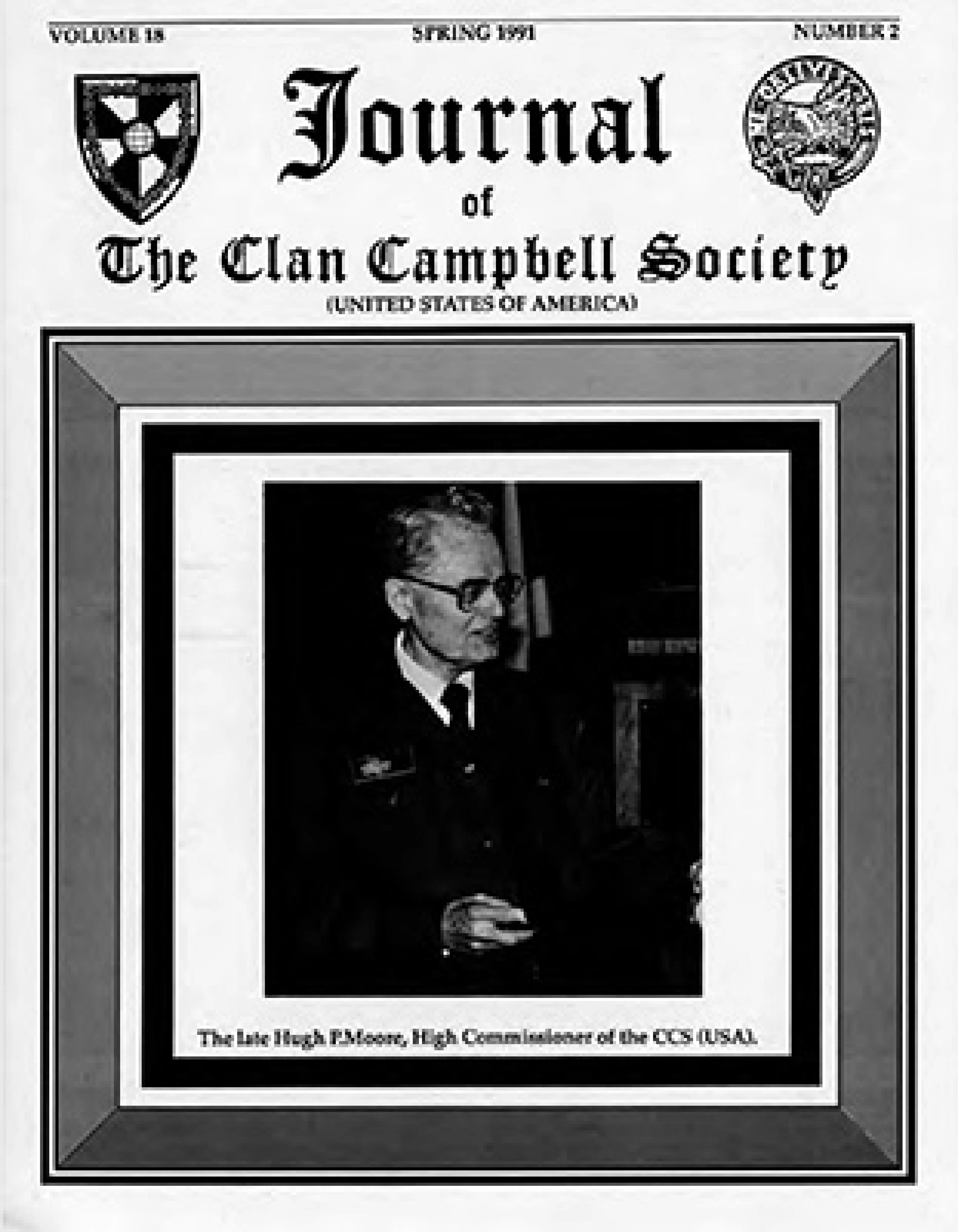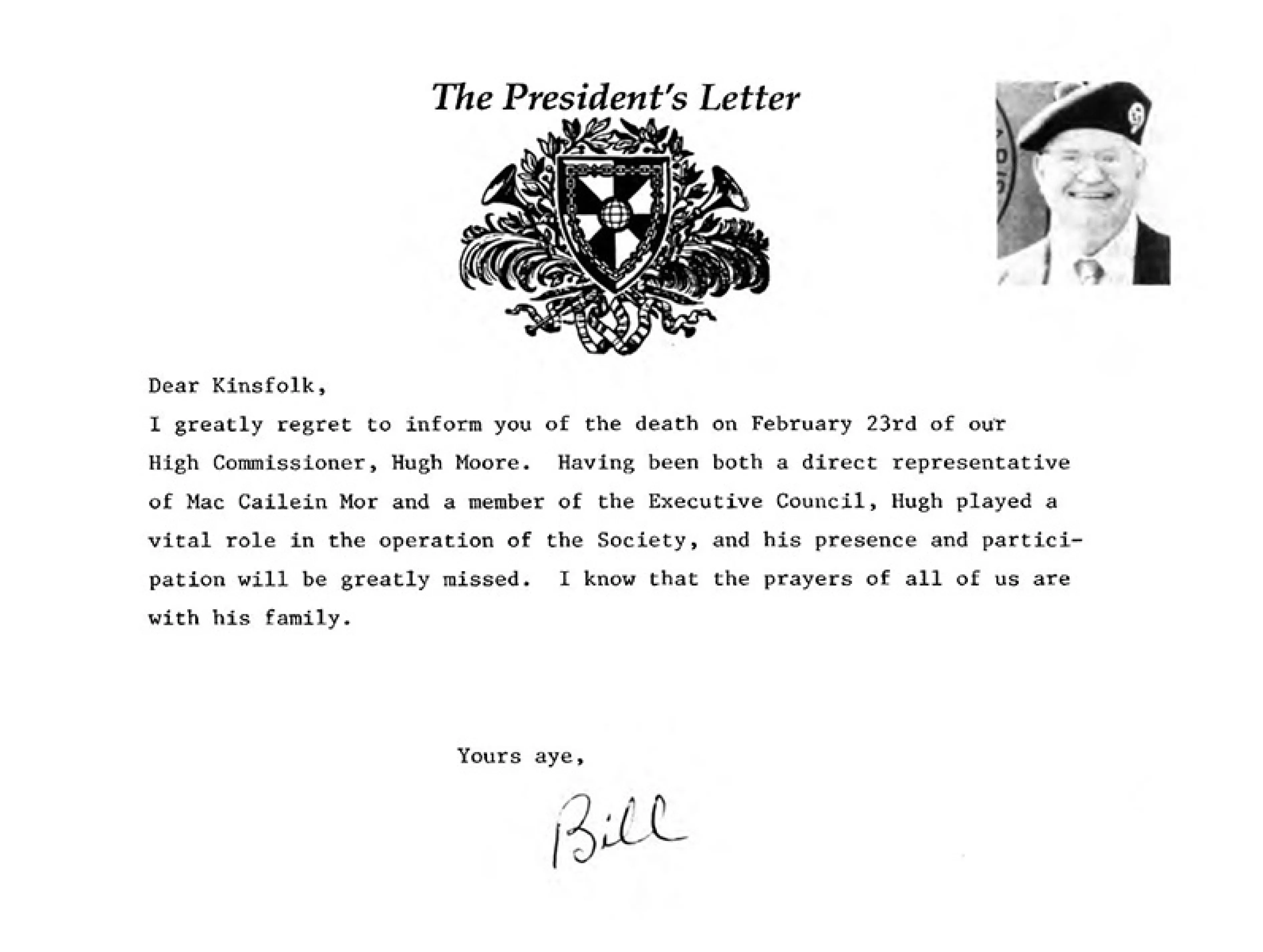HUGH PURFIELD MOORE, Esq.
High Commissioner of the Clan Campbell Society (USA)
by Donald Draper Campbell
Although Hugh Purfield Moore, Esq., died on 23 February 1991, he will live on as a stalwart of this Society: though not a founder of the Society, the Society could not have developed and matured as it did without him. He took an active roll in its early development and continued to guide it through both smooth and troubled times. He helped develop a solid foundation from which we can grow in the years to come. How did Hugh and the Society come together?
While attending my first Highland Games at Grandfather Mountain in July 1972, I met J. Bolyston Campbell (Malvern, PA), Judge Hugh Brown Campbell (Charlotte, NC) and Dr. B. Blackbum Thompson (Athens, GA) who were in the process of founding the Clan Campbell Society (USA). These men became the founding officers (President, Vice-President and Secretary /Treasurer, respectively) the following July at Grandfather Mountain, at which time I began my serious involvement with the development of our Clan Society which led to meeting Hugh Moore in the fall of 1974.
n January 1974 the Clan Campbell Society of the United States was created in New York at the request of our Clan Chief, MacCailein Mor, and headed by the Chief's sister, Lady Jean Campbell, who then resided in New York City. The two organizations discovered each other that summer and decided to join together as one: The Clan Campbell Society, United States of America. This merger was completed at Stone Mountain, GA, in October 1974.
Hugh had for some years been tracing his genealogy and learned that his family descended from the Muirs of Rowallan and the Earls of Loudoun (i.e., the Campbells of Loudoun), both Ayrshire families. Hugh's Muir or Moore ancestors had lived near Campbeltown in Kintyre for several generations under the patronage of the Duke of Argyll. In Hugh's quest for information he ended up at Inveraray Castle where he met our Chief, MacCailein Mor. Hugh expressed a desire to become involved in the Clan Society in the United States, so MacCailein Mor suggested that the next time he visited his son Allen Moore in Washington, DC, that he contact me since I was actively involved with the merger of the two Clan Campbell organizations. I received a telephone call from Hugh in September 1974 and had lunch with Hugh and Allen, which was the beginning of Hugh's very active involvement with Clan Campbell in the United States and a very close friendship for me with Marian and Hugh.
Soon afterward on 5 November 1975 there was the fire at Inveraray Castle and Hugh stepped in and began the task of raising funds for the restoration of the Castle in the United States. At the Annual Business Meeting at Grandfather Mountain in July 1976, Hugh was pressed into service along with Philip Douglas Thompson, John Edward Vickers-Smith, Jr. and myself to draft new rules of self-government for the Society. In May of 1977 the new rules were adopted, the Society's name was changed to The Clan Campbell Society (United States of America), and Hugh was elected a Trustee of the Society, a position he held until 1983 when he was appointed Deputy High Commissioner by MacCailein Mor.
In 1988 MacCailein Mor appointed him High Commissioner of the Society, a position he held until his untimely death.
Since he had done all the research, I encouraged Hugh to apply for matriculation of arms from the Lord Lyon in 1986, and arms were granted the following year. With his interest for research of all things Campbell, he facilitated the establishment of the Jacob More Library at Inveraray which contains the largest private collection of Scottish papers and has become a center for research for many historians. He was also instrumental in persuading Alastair Lome Campbell, Yr of Airds, to take the position of overseeing the development of the library and being its chief historian.
We are all truly indebted to his insight, patience and wisdom; Hugh helped provide a strong foundation for Clan Campbell and he will be sorely missed, both here and in Scotland.
PHOTO CAPTION: 'The flag was at half-mast' over Inveraray Castle as a token of tribute to the late Hugh P. Moore, High Commissioner (Chief's representative) for the Clan Campbell Society (USA). This extraordinary and unique gesture was made by order of our Chief Mac Cailein Mor in memory of Hugh Moore and as a signal to the Moore family and to the members of the Clan Campbell Society (USA), among others, of the regard in which Hugh was held at lnveraray. Our Chief's eloquent written tribute to Hugh Moore can be found in the previous issue of the Journal. (See below)
DEPUTY HIGH COMMISSIONER CLAN CAMPBELL SOCIETY (USA) GRANTED ARMS
By Diarmid A. Campbell
c.1987
ARMS OF HUGH MOORE, Esq.
The Lord Lyon, Her Majesty's Supreme Officer of Honour in Scotland, has granted arms to Hugh P. Moore, Deputy High Commissioner of the Clan Campbell Society U.S.A.
More than 10 years ago Hugh Moore began searching for proof of his descent from the Moores or Mures of Rowallan in Ayrshire. On April 24, 1986, he submitted his information in a petition to the Lord Lyon who is directly responsible to the Crown for all heraldic and genealogical matters in Scotland. The Grant of Arms was signed on the 16th of March 1987.
An illustration in color of the Ensigns Armorial devised by the Lord Lyon appears on the border of the grant and is reproduced with this article in black and white. The illustration contains the Campbell gyronny of eight, and the two principal elements from the Mure of Rowallan arms. Those elements are three mullets or stars on a fess azure (blue band) on the shield and a Moor's head proper (facing left) for crest. The paly of eight gules and argent (alternating vertical stripes of red and white) on the lower part of Hugh's shield refer to his nationality as being a citizen of the United States.
The motto "I do not forget" is an answer to the Campbell chief's motto, “Ne Obliviscaris".
Mures held the barony of Rowallan from at least 1263 until 1700. The Sir William Mure who died in 1657 was a staunch supporter of the Marquis of Argyll during the wars of the covenanters. Sir William and three of his sons served as officers in their armies, and one was killed in Ireland.
In 1650 two of Sir William's sons, Colonel Robert and Comet Alexander, received from the Marquis 19 year tacks (leases) of lands in southern Kintyre and became vassals of the Campbell chief. They were two of the 12 lowland proprietors who brought their families, servants and tenants from Ayrshire to the Campbeltown area.
In 1685 members of the next generation of the Moore family joined the ninth Earl of Argyll's rebellion in support of the Duke of Monmouth. The rebellion was a disaster, Argyll and Monmouth were beheaded and William Moore, along with many others, was banished. After living 16 years in Ulster, several members of the Moore family emigrated to Delaware in 1701.
The last Sir William Mure of Rowallan died in 1700 leaving the barony to a granddaughter, Lady Jean Boyle Mure. The heiress married General Sir James Campbell of Lawers and their only son, James Mure Campbell, became the fifth Earl of Loudoun, inheriting the Loudoun title from his cousin.
The present Countess of Loudoun in her own right and twelfth holder of the title is a descendant of the fifth Earl and the representative of the Mures of Rowallan.
HUGH MOORE APPOINTED THE HIGH COMMISSIONER OF THE CLAN CAMPBELL SOCIETY (USA)
BY MAC CAILEIN MOR
Jan 8, 1988
Our former Deputy High Commissioner, Hugh P. Moore, FSA Scot., is to be congratulated upon his appointment as High Commissioner to the Clan Campbell Society (USA).
The position of High Commissioner is outlined in the Bylaws of the Clan Campbell Society (USA); ''The High Commissioner is the personal representative of Mac Cailein Mor, the Hereditary Chief of Clan Campbell, and as such, shall be appointed by him to serve at his is an ex-officio member (and) shall vote on matters before the Council only in case of a tied vote."
Lady Jean Campbell, long her brother's representative as High Commissioner, having moved to Rome, has decided to step down and Hugh Moore, who had acted as her Deputy, has been appointed by our Chief to take her place. The members owe a debt of gratitude to Lady Jean for the years during which she served her clan through the Society. As her Deputy, Hugh Moore acted in the capacity outlined further in the Society Bylaws; "Mac Cailein Mor may also select a Deputy High Commissioner to act when the High Commissioner in unable to be present. All references to High Commissioner shall refer to either person."
Clearly the most important attributes for a High Commissioner are that they have the trust of the Chief and are in a position to travel to wherever the clan organization gathers for their meetings. Hugh Moore has amply demonstrated that he fulfills these requirements. A Highland Chief today is in a particularly vulnerable position with regard to his clan organizations and members since on the one hand the Chief's position is largely one of figurehead, but on the other, blame for the failings of the clan organizations or members are easily laid at the Chief's doorstep. Organizations concentrating upon their own fiscal responsibility and the needs of their members have also to bear in mind that because their Chief as figurehead costs them no cash, they equally have a responsibility to treat their Chief with the consideration and courtesy which is inherent in the position as head of the family. Hugh Moore has consistently fought that our clan organization bear in mind the courtesy and respect which we owe to our Chief and he is to be greatly honored for his continuing loyalty and concern.
CHIEF PRESENTS HIGH COMMISSIONER WITH HIS BANNER
C. Winter 1988
Hugh Purfield Moore, High Commissioner for the Clan Campbell Society (USA), was presented with the banner which his recent grant of arms by the Lord Lyon King of Arms allows him to display.
The presentation was made by Mac Cailein Mor, His Grace the Duke of Argyll, Chief of Clan Campbell, at the banquet held during the clan Gathering at Santa Rosa in California. The presentation was made on behalf of the Chief Himself, the Chief Executive of Clan Campbell and on behalf of the Society in gratitude for Hugh Moore's very great efforts for the preservation and augmentation of the Campbell records at Inveraray and the outstanding contribution which he has made to the clan and the Society in particular.
In heraldic language the device is described as "Per fess gyronny of eight Or and Sable and paly of eight Gules and Argent, on a fess Azure three mullets Or."
Translated into modern English from the heraldic Norman French, this means that across the upper part is a gyronny of eight in gold and black (Or and Sable), representing Campbell; across the lower part are vertical stripes in red (Gules) and silver (Argent) and across the centre a band of blue (Azure) with three stars in gold (mullets Or). The red, silver (heraldry uses silver in place of white) and blue are for the United States and the three mullets for Mure of Rowallan.
Two younger sons of the Mures of Rowallan became vassals of the Campbell chief in 1650 when they came to live in his Lordship of Kintyre, likely at his invitation. Hugh Moore descends from one of these Rowallan sons.
Those who can trace their origins to Scotland or to pre-revolutionary America or to Canada or are appointed officers of a clan society are eligible to be granted arms by the Lord Lyon. Arms in Scotland were originally not so much a matter of social standing as of willingness and ability to lead in battle. It has been said that he who could turn up with a horse and spear at the hosting had a right to arms. Perhaps the modem equivalent is a pickup truck with a rifle in the rack. However, Hugh Moore has very much higher qualifications.
The position of High Commissioner is one which only exists at the pleasure of the chief. The first High Commissioner to the CCS(USA) was the chief's sister who then lived in New York. When she left the country Hugh Moore, who had been Deputy High Commissioner, was appointed. The High Commissioner acts as the chief's representative to the clan Society. There is currently no Deputy High Commissioner.
The ancient use of heraldic banners was both as rallying emblems for the followers of a chief or chieftain or one of their officers, and as symbols of pride in the kin and the clan.
The modem use of such heraldic banners is to add colour and dignity to the office and to events such as parades at Highland Games, where a keenly felt need for ceremony and for symbols of clan pride has recently resulted in the use of tartan banners which were never known in ScotJand. Perhaps in time the wider use of heraldic banners will come to replace less authentic efforts. Heraldic banners can also be flown over clan tents when the armiger (one granted the arms on the banner) is present.
PHOTO CAPTION: Hugh Moore and Marian Moore with their eldest son Michael Moore hold the heraldic banner presented to Hugh, High Commissioner for the Clan Campbell Society (USA) at the Santa Rosa, CA Gathering.
TRIBUTES TO HUGH PURFIELD MOORE, Esq.
Late High Commissioner of the Clan Campbell Society (USA)
Mac Cailein Mor, Ian Campbell, Duke of Argyll, Chief of Clan Campbell
C. Spring 1991
Hugh came into my life in his inimitable discreet way some twenty years ago when the then Chamberlain of Argyll, Ken Short, approached me with words to the effect that he had had a number of meetings with a remarkably nice and "quiet American" who was researching his ancestors in Argyll - he had not expressed a wish to meet me, but surely I might find him an interesting and congenial character.
A little time elapsed and we duly met here. During this period in the early '70s I was actively engaged in the re-structuring of the Clan Campbell Society (USA).
Hugh was then, as he continued to be the rest of his life, a paragon of humility and diffidence. I was struck by his gentleness and intense passion combined with knowledge already acquired of this all too complex subject he was pursuing - some intangible aura emanated from his soul that told me that I was in the presence of a truly exceptional man - he did not claim to be of Campbell descent and never spoke about himself, but in a whimsical way he gave the impression that he was pleased that I took a small interest in his hobby.
This casual acquaintance rapidly transformed itself into what I can only describe as a relationship which was to become ever closer and more valued as time went by, to the point that I seldom took a decision concerning my activities, whether of a Clan or straightforeward business nature on a global basis, without consulting Hugh's brilliant mind.
It was at this time that I met again through Hugh, another exceptionally talented man on his CETEC board - James Coltart - who years later would breathe life again into the Royal Caledonian Schools as its Chairman; this was rewarded in 1986 when Her Majesty The Queen would come to Bushey and open a House in his name.
In late 1975 Inveraray Castle suffered a serious setback. No one worked more untiringly to raise funds to restore what appeared a lost cause; literally thousands of letters were processed personally by Hugh and his P.A. Barbara DeGelia. A single contribution of $100,000 from a Campbell in 1977 was treated with the same enthusiasm as that of $1 from a friend in Keokuk, Iowa.
Hugh in reality gave his all to The Restoration; and again, an example of the stature of this giant of a man, it was only after following me all over the girders of the roof of the castle in the early stages of the work that he confessed to an appalling vertigo; but his determination and great courage allowed him to overcome this frightening disability thus indicating a portent of things to come.
During those early days of overwhelming difficulties Hugh firmly pinned his colours to the mast, indeed he never wavered - a sign in itself that he had an ample supply of Campbell genes; one cannot help but be influenced by those who stick with you when many consider "you are backing a loser'', a fact that further endeared me to the qualities of an immensely valued friend, a further precursor to considering him, perhaps presumptuously, as a member of the family, a situation we both seemed to be increasingly comfortable with; as each was able to guage without direct communication what the other might think or accept.
Hugh's principles were of the highest and he stuck to them unswervingly throughout his life. A typical example of his loyalty was the fact that the girl he married and who was to be his best friend and supporter throughout his many years on this earth was one with whom he had grown up in North Dakota.
They were blessed with two sons, Michael and Alan, of whom they were justly intensely proud; this joy and affection would continue as the grandchildren came in time.
Hugh built up Cetec International with the help of colleagues from scratch, effectively giving it public birth when it obtained a listing on the Big Board. I shall always remember a picture of a much younger Hugh beaming, but not gloating, as His Company came up on the tape for the first time, this I saw on one of my very first visits to their cosy unostentatious home in West Covina.
Hugh and Marian moved from a rural and provincial background, which they never forgot, to a materialistic and somewhat artificial part of the world. Whilst they made many friends, neither of them were impressed by the great display of wealth which surrounded them, rather they were somewhat bemused by the antics of those whose behaviour was totally alien.
None of the vulgarity or brashness ever tainted them, though they were courted by many; they managed according to true Christian principles instilled so early in their lives.
Hugh was CETEC and never happier than taking me through his various plants, where he knew each employee by name. He was aware of their joys, problems and sorrrows, forever trying to bring forth and up those with potential for greater responsibility.
Hugh never forgot those who had helped him in the past; Wes Le Fever is a typical example when life dealt him such a tough card. Hugh's devotion was ever consistant with the high principles from which he was never to deviate.
Bob and Kyoko excercised him when CETEC was sold, but he ensured that the Nelsons were secure under new circumstances; I am certain that this was true for all who formed part of the Group. We spent many hours here agonising over the fate of so many, a problem that might not have been taken so seriously by many of our fellow men.
All these and more were virtues which he applied to Clan Campbell, from attending to the smallest of details, to the masterminding of the overall organization, whilst always giving credit to someone else. As in every voluntary organization, one cannot tell people what to do, one cannot apply any disciplinary pressure when warranted, but Hugh was a master of the effective understatement. In another translation he would have attained the highest rungs of the diplomatic ladder, where the constituency he represented would have prospered and no problems would ever have been insuperable.
The Clan Society benefited from a myriad of unseen and unsung actions conducted on its behalf by this visionary man; he believed so rightly in strong leadership and to that end he persuaded, cajoled and perhaps in the nicest way twisted the arms of REAL PEOPLE to come on the Board of the Executive Council. In its relatively short history our Society owes much of the success it now enjoys to the prudent and always inspired choices Hugh made on its behalf.
Hugh and I met with each other across three continents of the earth, we shared with our Clan Society its remarkable renaissance, more especially its joyous occasions, none more so than last September in Santa Rosa, in the High Commissioner's home state.
There will forever be a practical memorial to Hugh at Inveraray in the form of the Jacob Moore Library where Hugh's picture hangs in pride of place. This is increasingly used each year by scholars and Campbells alike. It was Hugh who made this possible, through the establishment of a position of Archivist/Historian/Chief Executive to the Clan. This effectively put the whole concept of Clanship into a higher gear and gave a veracity of purpose to our larger family, a unique privilege for a Clan Chief.
Let us give thanks for a full and active life, let us realise the debt we all owe to Hugh, who gave so very much to each and every one of us and let us join in the grief of his family at this time.
NE OBLIVISCARIS
TRIBUTE TO HUGH P. MOORE, Esq.
Alastair Campbell of Airds, Yr.,
Chief Executive of Clan Campbell
Hugh's passing leaves an aching void for so many of us who were proud and happy to count him as a friend. If ever there was a man who left the world a better place than he found it, it was him.
And all done so quietly and with such humility and modesty which might have hidden the strength that was underneath. "One of Nature's Gentlemen" is a poor phrase but it will have to do.
Mary-Ann and I have been privileged to see Hugh and Marian in action around the world; everywhere they have been they have left new friends behind them. They have been wonderful ambassadors for their country, and their clan. That sadly is now at an end but Hugh's memory will persist in so many hearts in so many places.
TRIBUTE TO HUGH P. MOORE, Esq.
Joe McD. Campbell
Immediate Past President of Clan Campbell Society (USA)
The family of Clan Campbell has lost a true gentleman and an outstanding leader. I have lost a dear colleague, a mentor, a confidant, a friend. Hugh was kind, considerate, modest, soft spoken, energetic and wise. Although he was a captain of industry (founder, president, Chief Executive Officer and Chairman of the Board of the CETEC Corporation) and held many high offices in Scottish societies, he was never pompous of full of his own self-importance. In fact, one of his greatest loves and talents was in talking new recruits into joining the Clan Campbell Society.
Yes, he loved all things Scottish, and above all he loved the Clan Campbell. In 1974 he was elected to the position of Trustee to the Clan Campbell Society (USA). He founded the Jacob Moore Society, named for one of his family whose ancestors served under the Earls of Argyll and were descended from the Muirs of Rowallan. The Jacob Moore Society was instrumental in raising funds towards restoring Inveraray Castle after the disasterous fire in 1975. In honor of that support, the archival library on the upper floor of the castle is named for the Jacob Moore Society. Hugh also founded the Friends of Argyll whose mission is to make possible historical research into the voluminous Argyll and Campbell archives and papers.
In 1984 MacCailein Mor appointed Hugh to act as his personal representative to the Clan Campbell Society (USA) in the position of Deputy High Commissioner. In 1987 Hugh was elevated to the position of High Commissioner. This was the first time that a person had held that office who was not of the Duke's personal family. In that position Hugh acted, not as the power behind the president nor as a dictator of policy; rather, he was the strength and counsel behind the president. I personally benefitted from that strength and counsel on many occasions. Hugh never imposed or demanded anything but worked in harmony to ensure that the history, traditions, heritage and love of Clan and Scotland blended together with the new ideas and concepts of today.
Although I am not in Hugh's immediate family, I mourn the loss of my friend deeply. My love and my heart-felt sympathy go out to Marian, Michael, Alan and their families.
And Hugh, I will miss you my friend.
EDITORIAL TRIBUTE TO HUGH P. MOORE, Esq.
Diarmid A. Campbell, Esq.
Journal Editor Clan Campbell Society (USA)
There used to be bards who strung verses to their clarsach and sang of the adventures of the leaders of their people. I am no bard, merely a collector of tales and a wrestler with history. But with no bard here to serve his memory I must do my best for Hugh Moore who did so very much for Clan Campbell and for the US Society of the clan.
Others may offer the facts, but for me remains the task of sentiment in recalling the steadfastness and quiet strength of one I was priveleged to know.
In Gaelic society there was the lament of the bard for a hero gone from our midst, the salute to the pyre of the fear an tigh, the Father of our House among the houses or societies under the Chief. Hugh Moore, as Chief's Representative to the Clan Campbell Society (USA) in his position as High Commissioner to the Society, became a true father to our Society.
Hugh Moore ran as a child through the long grass and stubble on the high plains of the Dakotas, growing up among farming people who were used to a harsh and vigorous climate. He studied journalism at university but in time he chose to accept an opportunity to work in California where, like all of his generation, he knew hard times in the Depression.
Hugh survived and learned to be a manager in industry. After the Second War he came to run a company of his own. Selling that successfully, he began to buy useful but less prosperous small manufacturers and, by providing them with streamlined services and sound management, helped them grow again.
Brought up in a small and conservative community, Hugh held strong principles in life, yet in such a way that he never allowed them to shrink him into bigotry but always to expand him into appreciation without personal compromise.
Perhaps much of his genius lay in chosing those he could trust and in winning their trust himself. Somewhat unique as a businessman, he understood that people who were treated thoughtfully would be better able to produce well. He appears to have made a priority of his interest in people, allowing that profit pursued for itself in disregard for people was not worth the candle. As a consequence people produced well for him.
In the early seventies Hugh Moore became intrigued by his heritage in Scotland. He began to investigate the history of his family. From his father he had learned of a tradition that they had come from Campbell lands in Argyll and one summer day Hugh turned up at Inveraray Castle. Like so many thousands of other visitors, he paid for a ticket at the north door and stepped across the thresho Id into the past. But for Hugh Moore it was a step into the realm of his heritage, a step which would benefit Clan Campbell, it's Chief and the Castle.
For Hugh, it went without saying that such interest meant a quiet and creative sense of responsibility, the mark of a leader. His leadership was particularly evident in 1!is ability to inspire others, whom he trusted, to excel while he most frequently stepped back to leave them enjoying the lime-light, expecting none for himself.
Without ever asking to meet Mac Cailein Mor, Hugh made a friend at Inveraray who could answer his questions. In time he and his Chief did come to meet and must have recognised in each other a thought ful reserve covering a lively awareness of possibilities, both in what are known as the affairs of the world and in the spirit of the clan.
Not long before, the Clan Campbell Society (USA) had been founded with the agreement of Mac Cailein Mor and by a diverse band of Campbells at the Games at Grandfather Mountain in the Carolinas. Returning home through Washington where his younger son was working, Hugh Moore made contact with the Society on the recommendation of his Chief. So began an association which would last for the rest of Hugh's life.
Like few other Americans or even Britons, Hugh Moore came to understand the fine ballance upon which the relationship of a Chief and their clan depends today. His unerring instinct for what was appropriate would help to shape the future of the Society.
As one with personal experience of being a father of grown sons, Hugh understood the concept of a figurehead. But he also knew that with a family of thousands, a Chief's role demanded a more distant respect, no less warm but limited by humanity in the demands placed upon it.
Hugh had the keenest disregard for any who would take for granted the position of Mac Cailein Mor or of his own generosity. While he was at all times polite, he did not suffer fools gladly and the steel which tempered his extraordinary generosity was easily apparent to those who worked with him. It gave him a strength and authority which the Society badly needed during his years as High Commissioner.
Hugh's greatest strength lay in his simple and heart-felt but well directed caring. As Editor of the Journal I came to rely upon Hugh for his unerringly balanced advice when issues of the relationship between the Clan and the Society needed to be interpreted. He understood my loyalty to Clan Campbell as fundamental and my interest in the Society as an expression of that. I will miss him greatly.
Since I could not often afford to make long distance calls, Hugh would telephone me about every month or two weeks so that we could talk about the Journal or our individual historical or genealogical research, books on those subjects which we had found, or the people we had run across who might be inspired to help with the Clan or Society.
The support which Hugh's family gave to his work for Clan Campbell and the Society was always given unstintingly and our hearts go out to them in their loss, particularly to Marian whose warmth has touched so many of us.
Others will mention the part played by Hugh and the foundation which he had created in raising and steering funds to help with the rebuilding of Inveraray castle after the fire, and particularly for his work with his Chief in providing for the Argyll archives.
In both these tasks, Hugh Moore did monumental service for Clan Campbell and for the national history and identity of Scotland. Characteristically he did so with no fanfare, quietly and for no kudos to himself. His monument will be the historical re-evaluation of the part played by the Argyll family and Clan Campbell in the shaping of Scotland, a re-asessment which has already begun.
It is hoped that those wishing to contribute to this work, which Hugh began beside his Chief, will soon be given an opportunity to do so on a regular and annonymous financial basis as a memorial to Hugh Moore.
TRIBUTE TO HUGH P. MOORE, Esq.
The late Hugh P. Moore, High Commissioner of the Clan Campbell Society (USA).
Captain James H. Campbell, U.S. Navy (Ret.)
Past President, Clan Campbell Society, (USA)
I have just returned from California where I attended a beautiful memorial service for my dear friend Hugh P. Moore. Monday afternoon, as I sat talking with Marion, the boys, and their families, the day before the service, my mind flashed back to a time in New York.
It was a cold winter day and I had flown up from Virginia to meet Judge Hugh Campbell. Judge Hugh and I were waiting in Lady Jean's (Campbell) apartment on 72nd street, for the arrival of our Chief Ian Campbell (12th Duke of Argyll), Lady Jean's brother. The occasion was not a very happy one, the year being 1976, and the castle had suffered a terrible fire just the previous November. We had gathered there at the request of a man I had not previously met, one Hugh Moore. The purpose of our meeting was to organize efforts for raising funds in the United States to assist in the castle restoration.
About five o'clock in the afternoon, two gentlemen arrived, neither of whom I had met, though Judge Hugh knew them both. It was our Chief and Hugh Moore. Thus began our friendship, one that grew and flourished with the passing months and years. Not only did Hugh and I have a deep affection for each other, our wives were so compatible, and we were able to spend time with each other in our respective homes, as well as in England and Scotland. It is extremely difficult for me to try to express my deep affection and sense of personal loss. In a short space of time I have lost three dear friends, and the Clan has been deprived of the wisdom, counsel and guidance of Lyle Campbell, Judge Hugh and now Hugh Moore.
Hugh was a gentle and compassionate man; one who was constantly thinking of others; a man of integrity and honor; a man whose yea was yea and nay was nay; an individual of high moral courage; a friend and honored companion. I miss you Hugh Purfield Moore, and may God's blessing be with your family.
TRIBUTE TO HUGH P. MOORE, Esq.
The Late High Commissioner for the Clan Campbell Society (USA)
James R. Williams, Trustee Emeritus Clan Campbell Society (USA)
The loss of Hugh creates a profound gap in many of the Clan Campbell activities. Hugh was a most understanding and helpful leader.
I first met Hugh when he was working in a newspaper office in Langdon, North Dakota, in April 1937. My grandmother was a Moore and Hugh and I were cousins. Both of our Moore families came from Hancock County in Illinois. Both Hugh and I got interested in family genealogy and traced the family from farms in the Campbeltown area of southern Argyll in Scotland.
Through his extensive travels in Scotland, Hugh was able to trace the Moore line quite a way back. He wrote the story of this and it appeared in the CCS (USA) Journal. Naturally this research is great stuff for a genealogist.
It was during the annual meeting of the clan Society at Grandfather Mountain in North Carolina in 1975 that I again met Hugh in person. At that time he and the Society President asked me to become Regional Commissioner for the Great Lakes Region. I was a little reluctant about taking over such a job, but when Hugh suggested that I be coCommissioner with Judge Campbell from Chicago, I agreed.
State Commissioners had been appointed and we met together in an hotel in northern Indiana. We talked about publicizing the clan Society in the Great Lakes Region and getting it going and on the map. Each of the State Commissioners were hard working people and it was not long before we had a good organization going. Participation in various Scottish activities in the Region increased. The name of the Clan Campbell Society (USA) and the Clan Campbell became very well known.
Hugh's leadership and loving concern for the Clan Campbell Society (USA) has been a great rudder in the flow of the Society these many years. Many of you knew him a have worked with him. He has not only worked closely with members in the various states, but because his company had an operation Glasgow in Scotland, he often went there. This gave him an opportunity to become well acquainted with (12th) Duke of Argyll and to maintain a close relationship between the Scottish and American Campbells.
All of us who worked with Huge were moved by his low-keyed style and devotion to the Clan. He will be seriously missed and we all send our heartfelt regrets to his wife Marian and his two sons Michael and Allen. Hugh's memory will continue to be an inspiration for many of us for years to come.
